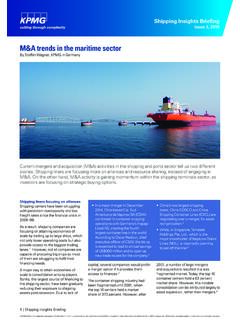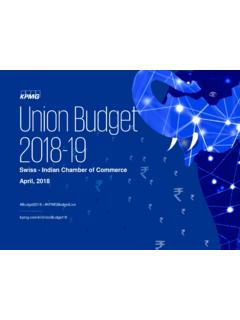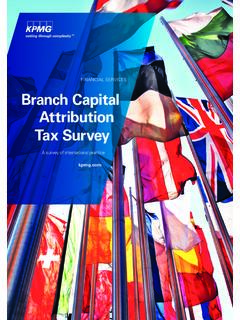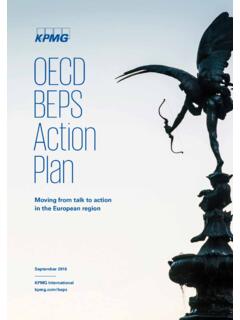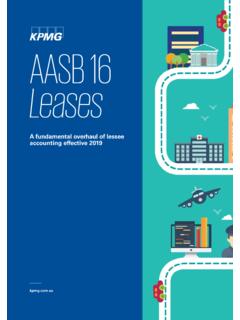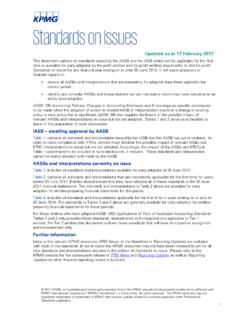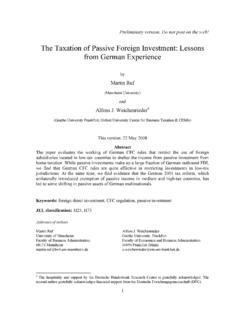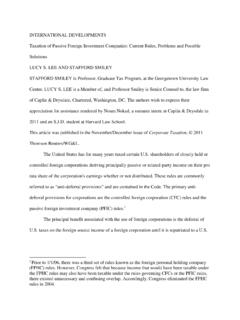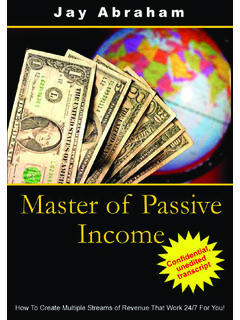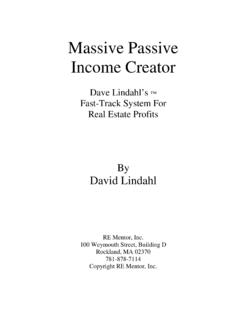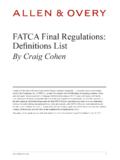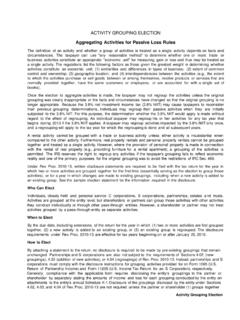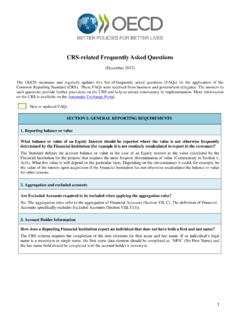Transcription of Private Companies — Passive Income Relief Announced
1 Page 1 of 3 Private Companies Passive Income Relief Announced October 18, 2017 No. 2017-47 Finance Minister Bill Morneau Announced that there will be no tax increase on Passive investment Income below a $50,000 annual threshold as part of new changes to the Private company tax proposals. The government confirmed that it will proceed with measures that target the deferral of tax benefits of Passive investments within Private corporations for Income above this new threshold. Finance said that it intends to release details of these proposed measures as part of its 2018 federal budget, including a technical description of the Passive investment Income rules. The Finance Minister made the announcement on October 18, 2017. The government is considering the recommendations of KPMG and other concerned taxpayers before finalizing any planned changes to Private company taxation. Finance reiterated that this new regime will apply on a go-forward basis.
2 Specifically, Finance said that investments already made by Private corporations owners, including future Income earned from these investments, are protected . It is still not clear exactly how Finance intends to implement these new rules, including any transitional measures, or when these rules will take effect. Background The government released a consultation paper and complex proposed rules and approaches to address certain tax planning involving Private corporations on July 18, 2017. The consultation paper, Tax Planning Using Private Corporations , looks at strategies that Finance believes inappropriately reduce personal taxes . Specifically, the consultation paper outlines proposals to address tax planning involving: TaxNewsFlash Canada October 18, 2017 Private Companies Passive Income Measures Announced No. 2017-47 Page 2 of 3 Income sprinkling using Private corporations Converting a Private corporation s Income into capital gains Holding a Passive investment portfolio inside a Private corporation.
3 Most of the proposed measures generally apply to the 2018 and subsequent tax years, except for certain measures dealing with the proposed anti-surplus stripping rule which would apply to shares disposed of, and amounts received or that become receivable, on or after July 18, 2017 ( , the consultation paper s release date). For full details on the consultation paper, see TaxNewsFlash-Canada 2017-38, Finance Targets Private Company Tax Planning . KPMG prepared a submission on the consultation paper that advised the government to delay implementing its proposed tax changes, and recommended certain technical fixes (see Consultation on Private Company Taxation KPMG Submission to Canada s Department of Finance and TaxNewsFlash-Canada 2017-44, Finance Targets Private Company Tax Planning ). Earlier this week, the government provided further clarification on its Private company proposals, and Announced that the small business tax rate would decrease to 9% (from ) by 2019 (see TaxNewsFlash-Canada 2017-46, "Small Business Tax Rate Drops to 9% by 2019 ).
4 New safe harbour test for Passive Income Finance said that it intends to introduce changes to allow up to $50,000 per year of Passive Income in a Private corporation to be unaffected by the new Passive Income proposals. The introduction of this threshold, according to the government, is intended to allow certain qualifying business owners to build up Passive investments for purposes of mitigating Income fluctuations, covering start-up costs or saving for maternity leave, among other things. Background As corporate tax rates are generally lower than personal tax rates, there is an incentive to earn Income in a corporation and then retain the after tax earnings in the corporation to earn Passive Income . While the current tax system applies additional refundable taxes on Passive Income to ensure that the tax paid on the Passive Income approximates the amount an individual in the top tax bracket would pay, Finance states that there is no tax provision to align the earnings available to fund the Passive investment within the corporation with the after tax amount that would be available to an individual if such Income was earned personally.
5 As a result, the use of a corporation TaxNewsFlash Canada October 18, 2017 Private Companies Passive Income Measures Announced No. 2017-47 Page 3 of 3 generally results in a greater amount of funds being available for Passive investment or savings. Other considerations Finance noted that, in drafting legislation to change the taxation of Passive investments for the 2018 federal budget, it will consider how any new rules will affect capital gains, including whether capital gains realized on the sale of shares of a corporation engaged in an active business should be excluded in certain circumstances. Further, Finance stated that it intends to maintain certain incentives to allow Canada s venture capital and angel investors to continue to invest in Canadian innovation. According to a press release, Finance said it will work with the venture capital and angel investment sectors to identify how this can be best achieved. Finance also specified that any proposed changes to Passive investment will not apply to Income from AgriInvest, a self-managed producer-government savings account.
6 We can help Your KPMG adviser can help you assess the effect of any potential changes to the taxation of Private Companies , including the changes to the Passive investment Income rules. For details on the implications for your company, contact your KPMG adviser. Contact Us | KPMG in Canada Privacy Policy | KPMG On-Line Privacy Policy | Legal Information is current to October 18, 2017. The information contained in this TaxNewsFlash-Canada is of a general nature and is not intended to address the circumstances of any particular individual or entity. Although we endeavour to provide accurate and timely information, there can be no guarantee that such information is accurate as of the date it is received or that it will continue to be accurate in the future. No one should act upon such information without appropriate professional advice after a thorough examination of the particular situation. 2017 KPMG LLP, a Canadian limited liability partnership and a member firm of the KPMG network of independent member firms affiliated with KPMG International Cooperative ("KPMG International"), a Swiss entity.
7 All rights reserved. The KPMG name and logo are registered trademarks or trademarks of KPMG International.




